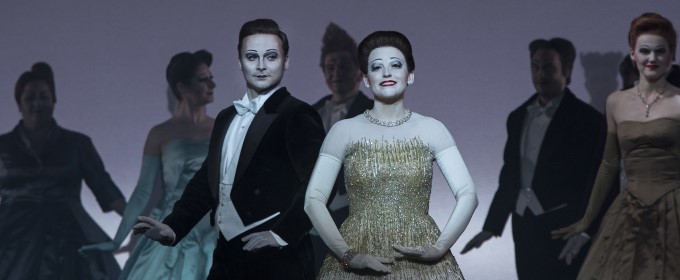Review: LA TRAVIATA at Grand Théâtre

When they tell you that Verdi's La Traviata is coming to town, you cannot expect anything other than a sold out show. And that is exactly what happened: one month before the performance there were barely any tickets left for what may well be the most prominent opera event of the season. The acclaimed theatre and visual artist Robert Wilson was responsible for the staging and lighting and, as usual, he helped to create a show that was absolutely unique. The musical director was Teodor Currentzis, a respected name in the field who has been serving as artistic director of the Perm Opera and Ballet Theatre since 2011.
Let us start perhaps with Verdi. There is no universe where he is not one of the greatest names of Western art and his contribution to music and culture can never be overstated. However, while La Traviata is one of the finest examples of his musical genius, we cannot help wondering if the story itself can live beyond its epoch. Remove the name Verdi from the front page and present the narrative to an educated individual who, for some reason, never came across this opera, and I truly wonder if you are going to receive an overwhelmingly positive feedback. There are moments of great quality in the dialogue and the overall symbolism of the play is to be admired. However, in mere narrative terms, it does seem slightly simplistic. The topics of love and self-sacrifice are central to the plot, but explored in an easy and overdramatic way.

For this reason, Wilson must be applauded for his bold staging choices, since he constructed a successful show where the actors are practically deprived of facial and physical expression. La Traviata can so easily be turned into something "kitsch and very sentimental," as the artist puts it, that presenting a play where the characters act with very little physical expression ends up resulting in a refreshing counterbalance to Verdi's excessive narrative sentimentalism. In some scenes this might have come off a bit too robotic for some viewers, especially during the high society parties, but I believe the overall result was quite interesting. The only elements used on set were white spikes, that would either gradually descend from the ceiling, or cross the stage like a small slow-moving tram.
Violetta Valéry was played by Nadezhda Pavlova, and our leading lady seemed quite up for the task. Of all the actors of the ensemble, Pavlova seemed to be the best singer, delivering all her lines with great reach, emotion and strength. In fact, she was the only soloist who could make herself heard at all times. The rest of the cast was by no means less impressive, but there were a handful of short soliloquies that could not be heard in all parts of the venue over the strength of the orchestra.

Alfredo Germont was played by Airam Hernández, an actor who sang with tremendous passion. His movements were quite limited, as mentioned, but all of Alfredo's feelings were perfectly carried out through his voice. He also gave this character an imposing appearance, which seemed to be ideal for his personality and behaviour. Dimitris Tiliakos played Giorgio Germont, Alfredo's father and one of the most instrumental pawns in the plot. His singing was also quite impressive, but I believe he stood out mostly for his acting skills. Even with limited movements (and an unhealthy amount of make-up), there was something about Tiliakos's presence and stage energy that seemed to speak entirely by itself.
This production was first presented to the public in June 2016 and we hope it will continue to marvel audiences around the world for years to come.
Image credit: Lucie Jansch
Reader Reviews
Videos

